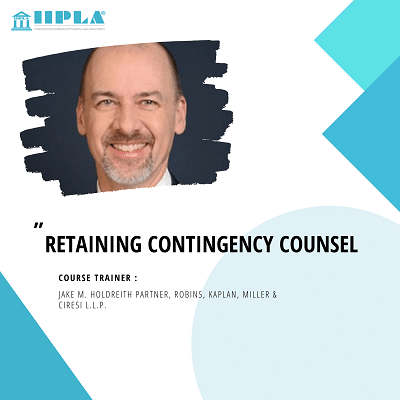Details
About the Course:
The costs of litigating a patent through trial can easily cost $10 million when more than $25 million is at stake. Thus, retaining contingency counsel seems like an attractive method to pursue infringers.
However, not all lawyers and law firms are equipped to engage in protracted litigation. And the best contingency law firms can afford to be highly selective in deciding which cases to pursue.
If you are a patentee and are experiencing infringement, you must be exercise extreme care when negotiating contingency agreements with law firms. You must understand that hiring contingency lawyers is not akin to purchasing a lottery ticket. You must understand your responsibilities and obligations to the law firm that is investing its own capital in asserting your patent. The interests of you and your lawyer must be aligned in order to inoculate yourselves from defense tactics designed to fractionalize the plaintiff’s efforts.
The following are among the issues discussed during this webinar:
- What are the major categories of expenses associated with patent litigation?
- What expenses should a plaintiff expect to pay even if the law firm works on a contingency basis?
- What documentation should a patentee prepare before meeting with a contingency law firm to increase the probability of the law firm agreeing to take on the case?
- Should a law firm have an exclusive review period when performing due diligence when considering taking on a contingency case?
- What structural elements must a contingency law firm have in place to be able to mount a sustainable assertion effort?
- What are the more successful partial contingency billing arrangements?
- Is it preferable for a law firm different from the one that conducted the patent prosecution to represent a plaintiff?
- Who has authority to settle the case? The patentee or the lawyer?
- What recourse does the contingency law firm have if the client refuses to follow the law firm’s advice?
- How will the law firm be compensated if the case is resolved by some means that only yields the plaintiffs a business advantage or a cross license, not a monetary advantage?
- Under what conditions can the law firm resign from the case?
- When can the plaintiff fire the law firm?
Course Leaders: Jake M. Holdreith, Partner, Robins, Kaplan, Miller & Ciresi L.L.P.
Jake’s practice focuses on intellectual property litigation with particular experience in patent and trade secret disputes. His litigation experience includes disputes in courts in the United States, Europe, Hong Kong, and other jurisdictions. Just a few of Jake’s selected results include:
- Trial counsel in Personal Audio LLC v. Apple Inc., a patent infringement case in which a Texas federal jury awarded our client, Personal Audio LLC, $8 million in damages for infringing a patent for an audio player that can download or receive navigable playlists. The jury found that Apple’s iPods infringed the patent. The verdict was announced on July 8, 2011. The court also awarded prejudgment interest in the amount of $4,182,331 for a total judgment of $12,182,331. Post trial motions are pending.
- Medicis Pharmaceutical Corporation v. Upsher-Smith Laboratories, et al. Lead trial counsel defending Upsher-Smith Laboratories in a patent suit to enjoin the sale of a pharmaceutical formulation. Following a two-day bench trial on the issues of infringement, validity and enforceability of the plaintiff’s patent, the Court denied a request to temporarily enjoin the client from making and selling its products. All claims asserted against our client were subsequently invalidated during an ex parte re-examination based on the same arguments and evidence we presented during the bench trial. The invalidity of the claims was summarily affirmed on appeal to the CAFC. The district court action is No. CV05-3458 (D. Az. filed October 27, 2005). The re-examination appeal is No. 2009-1291 (Reexamination No. 90/008,068).
- Trial counsel in St. Clair Intellectual Property Consultants, Inc. v. Canon, Inc. et al., No. 03-241 (D. Del., filed February 28, 2003) a case in which a federal jury in Wilmington, Delaware awarded Mr. Holdreith’s client, St. Clair, $34.7 million after a finding that Canon infringed four patents relating to digital camera technology. The verdict was announced on October 8, 2004.
Course Length: Approx. 1.5 hours









There are no reviews yet.